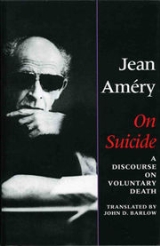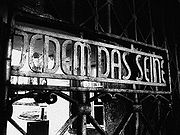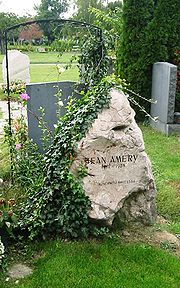
Jean Améry
Encyclopedia
Jean Améry born Hanns Chaim Mayer, was an Austria
n-born essayist whose work was often informed by his experiences during World War II
. Formerly a philosophy and literature student in Vienna, Améry's participation in organized resistance against the Nazi occupation of Belgium
resulted in his detainment and torture by the Gestapo
, and several years of imprisonment in concentration camps.
Améry survived internments in Auschwitz and Buchenwald, and was finally liberated at Bergen-Belsen
in 1945. His most celebrated work, At the Mind's Limits: Contemplations by a Survivor on Auschwitz and Its Realities, suggests that torture was "the essence" of the Third Reich. Other notable works included On Aging and On Suicide: A Discourse on Voluntary Death.
Améry committed suicide by taking an overdose of sleeping pills in 1978.
, Austria
in 1912, to a Jewish father and a Catholic mother. His father was killed in action in World War I
in 1916. Améry was raised as a Roman Catholic by his mother. Eventually, Améry and his mother returned to Vienna, where he enrolled in university to study literature and philosophy, but economic necessity kept him from regular pursuit of studies there.
The Nuremberg Laws
of 1935, the text of which he soon came to know by heart, convinced Améry that Germany had essentially passed a sentence of death on all Jews. His The Necessity and Impossibility of Being a Jew speaks to this inner conflict as to his identity. He suggests that while his personal identity, the identity of his own childhood past, is distinctly Christian, he feels himself nonetheless a Jew in another sense, the sense of a Jewishness "without God, without history, without messianic-national hope".
.jpg) In 1938, when the Nazis were welcomed into Austria and the country joined with Germany into a "Greater Reich", Améry fled to France, and then to Belgium with his Jewish wife, whom he had chosen in opposition to his mother's wishes. Ironically, he was initially deported back to France by the Belgians as a German alien, and wound up interned in the south.
In 1938, when the Nazis were welcomed into Austria and the country joined with Germany into a "Greater Reich", Améry fled to France, and then to Belgium with his Jewish wife, whom he had chosen in opposition to his mother's wishes. Ironically, he was initially deported back to France by the Belgians as a German alien, and wound up interned in the south.
After escaping from the camp at Gurs, he returned to Belgium where he joined the Resistance movement.
Involved in the distribution of anti-military propaganda to the German occupying forces, Améry was captured by the Nazis in July 1943 and routinely (and severely) tortured at the Belgian Gestapo center at Fort Breendonk
. When it was established that there was no information to be extracted from him, he was "demoted" from political prisoner to Jew, and shipped to Auschwitz.
Lacking any trade skills, he was assigned to the harshest physical labors, building the I.G. Farben factory at Auschwitz III, the Buna-Monowitz labor camp. In the face of the Soviet invasion in the following year, he was evacuated first to Buchenwald and then to Bergen-Belsen
, where he was liberated by the British army in April 1945.
 After the war, the former Hanns Mayer changed his name to Jean Améry (the surname being an anagram
After the war, the former Hanns Mayer changed his name to Jean Améry (the surname being an anagram
in French of his family name) in order to symbolize his dissociation from German culture and his alliance with French culture. He lived in Brussels, working as a culture journalist for German language newspapers in Switzerland. He refused to publish in Germany
or Austria
for many years, publishing only in Switzerland
. He did not write at all of his experiences in the death camps until 1964, when, at the urging of German poet Helmut Heißenbüttel
, he wrote his book Jenseits von Schuld und Sühne ("Beyond Guilt and Atonement"). It was later translated into English by Sidney and Stella P. Rosenfeld as At the Mind's Limits: Contemplations by a Survivor on Auschwitz and its Realities.
In 1976 Améry published the book On Suicide: A Discourse on Voluntary Death. He took his own life by overdose of sleeping pills in 1978.
Améry's efforts to preserve the memory of the Holocaust focused on the terror and horror of the events in a phenomenological and philosophical way, with what he characterized as "a scant inclination to be conciliatory". His explorations of his experiences and the meaning and legacy of Nazi-era suffering were aimed not at resolving the events finally into "the cold storage of history", but rather keeping the subject alive so that it would not be lost to posterity, as an abstraction or mere text. As he wrote in his 1976 preface to Beyond Guilt and Atonement:

Austria
Austria , officially the Republic of Austria , is a landlocked country of roughly 8.4 million people in Central Europe. It is bordered by the Czech Republic and Germany to the north, Slovakia and Hungary to the east, Slovenia and Italy to the south, and Switzerland and Liechtenstein to the...
n-born essayist whose work was often informed by his experiences during World War II
World War II
World War II, or the Second World War , was a global conflict lasting from 1939 to 1945, involving most of the world's nations—including all of the great powers—eventually forming two opposing military alliances: the Allies and the Axis...
. Formerly a philosophy and literature student in Vienna, Améry's participation in organized resistance against the Nazi occupation of Belgium
Belgium
Belgium , officially the Kingdom of Belgium, is a federal state in Western Europe. It is a founding member of the European Union and hosts the EU's headquarters, and those of several other major international organisations such as NATO.Belgium is also a member of, or affiliated to, many...
resulted in his detainment and torture by the Gestapo
Gestapo
The Gestapo was the official secret police of Nazi Germany. Beginning on 20 April 1934, it was under the administration of the SS leader Heinrich Himmler in his position as Chief of German Police...
, and several years of imprisonment in concentration camps.
Améry survived internments in Auschwitz and Buchenwald, and was finally liberated at Bergen-Belsen
Bergen-Belsen concentration camp
Bergen-Belsen was a Nazi concentration camp in Lower Saxony in northwestern Germany, southwest of the town of Bergen near Celle...
in 1945. His most celebrated work, At the Mind's Limits: Contemplations by a Survivor on Auschwitz and Its Realities, suggests that torture was "the essence" of the Third Reich. Other notable works included On Aging and On Suicide: A Discourse on Voluntary Death.
Améry committed suicide by taking an overdose of sleeping pills in 1978.
Early life
Jean Améry was born Hans Mayer in ViennaVienna
Vienna is the capital and largest city of the Republic of Austria and one of the nine states of Austria. Vienna is Austria's primary city, with a population of about 1.723 million , and is by far the largest city in Austria, as well as its cultural, economic, and political centre...
, Austria
Austria
Austria , officially the Republic of Austria , is a landlocked country of roughly 8.4 million people in Central Europe. It is bordered by the Czech Republic and Germany to the north, Slovakia and Hungary to the east, Slovenia and Italy to the south, and Switzerland and Liechtenstein to the...
in 1912, to a Jewish father and a Catholic mother. His father was killed in action in World War I
World War I
World War I , which was predominantly called the World War or the Great War from its occurrence until 1939, and the First World War or World War I thereafter, was a major war centred in Europe that began on 28 July 1914 and lasted until 11 November 1918...
in 1916. Améry was raised as a Roman Catholic by his mother. Eventually, Améry and his mother returned to Vienna, where he enrolled in university to study literature and philosophy, but economic necessity kept him from regular pursuit of studies there.
Religion
While Améry's family was "estranged from its Jewish origins, assimilated and intermarried", this alienation itself, in the context of Nazi occupation, informed much of his thought: "I wanted by all means to be an anti-Nazi, that most certainly, but of my own accord."The Nuremberg Laws
Nuremberg Laws
The Nuremberg Laws of 1935 were antisemitic laws in Nazi Germany introduced at the annual Nuremberg Rally of the Nazi Party. After the takeover of power in 1933 by Hitler, Nazism became an official ideology incorporating scientific racism and antisemitism...
of 1935, the text of which he soon came to know by heart, convinced Améry that Germany had essentially passed a sentence of death on all Jews. His The Necessity and Impossibility of Being a Jew speaks to this inner conflict as to his identity. He suggests that while his personal identity, the identity of his own childhood past, is distinctly Christian, he feels himself nonetheless a Jew in another sense, the sense of a Jewishness "without God, without history, without messianic-national hope".
During Nazi rule
.jpg)
After escaping from the camp at Gurs, he returned to Belgium where he joined the Resistance movement.
Involved in the distribution of anti-military propaganda to the German occupying forces, Améry was captured by the Nazis in July 1943 and routinely (and severely) tortured at the Belgian Gestapo center at Fort Breendonk
Fort Breendonk
Fort Breendonk is a fortification built in 1906 as part of the second ring of defences around the city of Antwerp . Originally one in a chain of fortresses constructed to defend Belgium against a German attack, Breendonk was near the town of the same name, about 12 miles southwest of Antwerp...
. When it was established that there was no information to be extracted from him, he was "demoted" from political prisoner to Jew, and shipped to Auschwitz.
Lacking any trade skills, he was assigned to the harshest physical labors, building the I.G. Farben factory at Auschwitz III, the Buna-Monowitz labor camp. In the face of the Soviet invasion in the following year, he was evacuated first to Buchenwald and then to Bergen-Belsen
Bergen-Belsen concentration camp
Bergen-Belsen was a Nazi concentration camp in Lower Saxony in northwestern Germany, southwest of the town of Bergen near Celle...
, where he was liberated by the British army in April 1945.
After the war

Anagram
An anagram is a type of word play, the result of rearranging the letters of a word or phrase to produce a new word or phrase, using all the original letters exactly once; e.g., orchestra = carthorse, A decimal point = I'm a dot in place, Tom Marvolo Riddle = I am Lord Voldemort. Someone who...
in French of his family name) in order to symbolize his dissociation from German culture and his alliance with French culture. He lived in Brussels, working as a culture journalist for German language newspapers in Switzerland. He refused to publish in Germany
Germany
Germany , officially the Federal Republic of Germany , is a federal parliamentary republic in Europe. The country consists of 16 states while the capital and largest city is Berlin. Germany covers an area of 357,021 km2 and has a largely temperate seasonal climate...
or Austria
Austria
Austria , officially the Republic of Austria , is a landlocked country of roughly 8.4 million people in Central Europe. It is bordered by the Czech Republic and Germany to the north, Slovakia and Hungary to the east, Slovenia and Italy to the south, and Switzerland and Liechtenstein to the...
for many years, publishing only in Switzerland
Switzerland
Switzerland name of one of the Swiss cantons. ; ; ; or ), in its full name the Swiss Confederation , is a federal republic consisting of 26 cantons, with Bern as the seat of the federal authorities. The country is situated in Western Europe,Or Central Europe depending on the definition....
. He did not write at all of his experiences in the death camps until 1964, when, at the urging of German poet Helmut Heißenbüttel
Helmut Heißenbüttel
Helmut Heißenbüttel was a German novelist and poet. Among Heißenbüttel's works are Das Textbuch and Marlowe's Ende . He received the important Georg Büchner Prize in 1969...
, he wrote his book Jenseits von Schuld und Sühne ("Beyond Guilt and Atonement"). It was later translated into English by Sidney and Stella P. Rosenfeld as At the Mind's Limits: Contemplations by a Survivor on Auschwitz and its Realities.
In 1976 Améry published the book On Suicide: A Discourse on Voluntary Death. He took his own life by overdose of sleeping pills in 1978.
Literary and philosophical legacy
The publication of At the Mind's Limits, Améry's stimulating and thought-provoking exploration of the Holocaust and the nature of the Third Reich, made him one of most highly regarded of Holocaust writers. In comparing the Nazis to a government of sadism, Améry suggests that it is the sadist's nature to want "to nullify the world". For a Nazi torturer,[a] slight pressure by the tool-wielding hand is enough to turn the other – along with his head, in which are perhaps stored Kant and Hegel, and all nine symphonies, and The World as Will and RepresentationThe World as Will and RepresentationThe World as Will and Representation is the central work of the German philosopher Arthur Schopenhauer. The first edition was published in December 1818, and the second expanded edition in 1844. In 1948, an abridged version was edited by Thomas Mann....
– into a shrill squealing piglet at slaughter.
Améry's efforts to preserve the memory of the Holocaust focused on the terror and horror of the events in a phenomenological and philosophical way, with what he characterized as "a scant inclination to be conciliatory". His explorations of his experiences and the meaning and legacy of Nazi-era suffering were aimed not at resolving the events finally into "the cold storage of history", but rather keeping the subject alive so that it would not be lost to posterity, as an abstraction or mere text. As he wrote in his 1976 preface to Beyond Guilt and Atonement:

I do not have [clarity] today, and I hope that I never will. Clarification would amount to disposal, settlement of the case, which can then be placed in the files of history. My book is meant to prevent precisely this. For nothing is resolved, nothing is settled, no remembering has become mere memory.
In German
- Karrieren Und Köpfe: Bildnisse Berühmter Zeitgenossen. Zurich: Thomas, 1955.
- Teenager-Stars: Idole Unserer Zeit. Vienna: Albert Müller, 1960.
- Im Banne Des Jazz: Bildnisse Grosser Jazz-Musiker. Vienna: Albert Müller, 1961.
- Geburt Der Gegenwart: Gestalten Und Gestaltungen Der Westlichen Zivilisation Seit Kriegsende. Olten: Walter, 1961.
- Gerhart Hauptmann: Der Ewige Deutsche. Stieglitz: Handle, 1963.
- Jenseits Von Schuld Und Sühne: Bewältigungsversuche Eines Überwältigen. Munich: Szczesny, 1966.
- Über Das Altern: Revolte Und Resignation. Stuttgart: Klett, 1968.
- Unmeisterliche Wanderjahre. Stuttgart: Klett, 1971.
- Lefeu Oder Der Abbruch. Stuttgart: Klett, 1974.
- Hand an Sich Legen. Stuttgart: Klett, 1976.
- Charles Bovary, Landarzt. Stuttgart: Klett, 1978.
- Bücher Aus Der Jugend Unseres Jahrhunderts. Stuttgart: Klett-Cotta, 1981.
- Der Integrale Humanismus: Zwischen Philosophie Und Literatur. Aufsätze Und Kritiken Eines Lesers, 1966–1978. Stuttgart: Klett-Cotta, 1985.
- Jean Amery, der Grenzganger: Gesprach mit Ingo Hermann in der Reihe "Zeugen des Jahrhunderts." Ed. Jürgen Voigt. Göttingen: Lamuv, 1992.
- Cinema: Arbeiten Zum Film. Stuttgart: Klett-Cotta, 1994.
- Jean Améry: Werke. 9 vols. Edited by Irène Heidelberger-Leonard. Stuttgart: Klett-Cotta, 2002-2008. The collected works in German.
Translations into French
- Charles Bovary, médecin de campagne: portrait d'un homme simple. Roman/essai traduit de l'allemand par Françoise Wuilmart. Actes Sud : Arles, 1991.
- Par-delà le crime et le châtiment : essai pour surmonter l'insurmontable. traduit de l'allemand par Francoise Wuilmart. Actes Sud : Arles, 1995.
- Du vieillissement. PayotPayotPayot is the Hebrew word for sidelocks or sidecurls. Payot are worn by some men and boys in the Orthodox Jewish community based on an interpretation of the Biblical injunction against shaving the "corners" of one's head...
: Paris, 1991 [1968] ; rééd. Petite Bibliothèque Payot 2009 - Le feu ou la démolition. Actes Sud : Arles, 1996 [1974]
- Porter la main sur soi - Du suicide. Actes Sud : Arles, 1999 [1976]
- Les Naufragés. Actes Sud: Arles, 2010 [1935]
Translations into English
- Preface to the Future: Culture in a Consumer Society. Trans. Palmer Hilty. London: Constable, 1964.
- At the Mind's Limits: Contemplations by a Survivor of Auschwitz and Its Realities. Trans. Sidney and Stella P. Rosenfeld. Bloomington: Indiana University Press, 1980.
- Radical Humanism: Selected Essays. Trans. Sidney and Stella P. Rosenfeld. Bloomington: Indiana University Press, 1984.
- On Aging: Revolt and Resignation. Trans. John D. Barlow. Bloomington: Indiana University Press, 1994.
- On Suicide: A Discourse on Voluntary Death. Trans. John D. Barlow. Bloomington: Indiana University Press, 1999.
Further reading
- Irène Heidelberger-Leonard, The Philosopher of Auschwitz: Jean Améry and Living with the Holocaust. Translated by Anthea Bell. London: I. B. Tauris, 2010. First published in German as Jean Améry: Revolte in der Resignation (Stuttgart: Klett-Cotta, 2004). Also published in French as Jean Améry (Arles: Actes Sud, 2007) and Spanish as Jean Améry: Revuelta en la resignación (Valencia: Universitat di Valencia, 2010).
- G, Risari, "Jean Améry. Il risentimento come morale", Milano: Franco Angeli, 2002
- W. G. SebaldW. G. SebaldW. G. Maximilian Sebald was a German writer and academic. At the time of his death at the age of 57, he was being cited by many literary critics as one of the greatest living authors and had been tipped as a possible future winner of the Nobel Prize in Literature...
, "Against the Irreversible" in On the Natural History of Destruction, Penguin, 2003, pp. 147–72.

